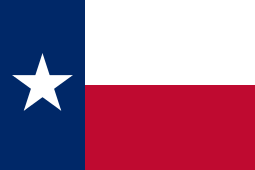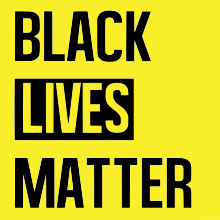Juneteenth
Juneteenth (a portmanteau of June and nineteenth)[2] – also known as Freedom Day,[3] Jubilee Day,[4] Liberation Day,[5] and Emancipation Day[6] – is a holiday celebrating the emancipation of those who had been enslaved in the United States. Originating in Galveston, Texas, it is now celebrated annually on the 19th of June throughout the United States, with varying official recognition. It is commemorated on the anniversary date of the June 19, 1865 announcement by Union Army general Gordon Granger, proclaiming freedom from slavery in Texas.[7]
| Juneteenth | |
|---|---|
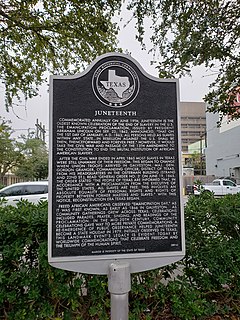 Site of former Union Army Headquarters at the Osterman Building, since demolished, where General Order No. 3 was read on Monday, June 19, 1865 | |
| Also called | Freedom Day, Jubilee Day, Liberation Day, Emancipation Day (TX) |
| Observed by | Americans (especially African Americans), 47 states of the United States[1] |
| Type | Historical, ethnic, cultural |
| Significance | Emancipation of remaining enslaved African-Americans in the Confederacy |
| Observances | African American history, culture and progress |
| Date | June 19 |
| Next time | June 19, 2021 |
| Frequency | Annual |
President Abraham Lincoln's Emancipation Proclamation had officially outlawed slavery in Texas and the other states in rebellion against the Union almost two and a half years earlier. Enforcement of the Proclamation generally relied on the advance of Union troops. Texas being the most remote of the slave states had a low presence of Union troops as the American Civil War ended; thus enforcement there had been slow and inconsistent before Granger's announcement.[7] Although Juneteenth generally celebrates the end of slavery in the United States, it was still legal and practiced in two Union border states (Delaware and Kentucky) until later that year when ratification of the Thirteenth Amendment to the Constitution abolished chattel slavery nationwide in December.[8][9][10][lower-alpha 1]
Celebrations date to 1866, at first involving church-centered community gatherings in Texas. It spread across the South and became more commercialized in the 1920s and 1930s, often centering on a food festival. During the Civil Rights Movement of the 1960s, it was eclipsed by the struggle for postwar civil rights, but grew in popularity again in the 1970s with a focus on African American freedom and arts.[11] By the 21st century, Juneteenth was celebrated in most major cities across the United States. Activists are campaigning for the United States Congress to recognize Juneteenth as a national holiday. Hawaii, North Dakota and South Dakota are the only states that do not recognize Juneteenth, according to the Congressional Research Service.[12]
Modern observance is primarily in local celebrations. Traditions include public readings of the Emancipation Proclamation, singing traditional songs such as "Swing Low, Sweet Chariot" and "Lift Every Voice and Sing", and reading of works by noted African-American writers such as Ralph Ellison and Maya Angelou. Celebrations include rodeos, street fairs, cookouts, family reunions, park parties, historical reenactments, and Miss Juneteenth contests. The Mascogos, descendants of Black Seminoles, who escaped from U.S. slavery in 1852 and settled in Coahuila, Mexico, also celebrate Juneteenth.
History
End of slavery in Texas
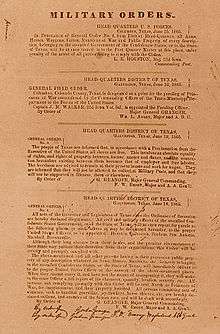
During the American Civil War, President Abraham Lincoln issued the preliminary Emancipation Proclamation on September 22, 1862.[13] It was formally issued on January 1, 1863, declaring that all enslaved persons in the Confederate States of America in rebellion and not in Union hands were freed.[13][lower-alpha 1]
More isolated geographically, planters and other slaveholders had migrated into Texas from eastern states to escape the fighting, and many brought enslaved people with them, increasing by the thousands the enslaved population in the state at the end of the Civil War.[14] Although most lived in rural areas, more than 1,000 resided in both Galveston and Houston by 1860, with several hundred in other large towns.[15] By 1865, there were an estimated 250,000 enslaved people in Texas.[14][16]
Despite the surrender of General Robert E. Lee at the Old Appomattox Court House on April 9, 1865, the western Army of the Trans-Mississippi did not surrender until June 2.[17] On the morning of Monday, June 19, 1865, Union Major General Gordon Granger arrived on the island of Galveston, Texas[18] to take command of the more than 2,000 federal troops[19] recently landed in the department of Texas to enforce the emancipation of its slaves and oversee a peaceful transition of power, additionally nullifying all laws passed within Texas during the war by Confederate lawmakers.[18] The Texas Historical Commission and Galveston Historical Foundation report that Granger’s men marched throughout Galveston reading General Order No. 3 first at Union Army Headquarters at the Osterman Building (formerly at the intersection of Strand Street and 22nd Street, since demolished), in the Strand Historic District. Next they marched to the 1861 Customs House and Courthouse before finally marching to the Negro Church on Broadway, since renamed Reedy Chapel-AME Church.[20] The order informed all Texans that, in accordance with a Proclamation from the Executive of the United States, all slaves were free:
The people of Texas are informed that, in accordance with a proclamation from the Executive of the United States, all slaves are free. This involves an absolute equality of personal rights and rights of property between former masters and slaves, and the connection heretofore existing between them becomes that between employer and hired labor. The freedmen are advised to remain quietly at their present homes and work for wages. They are informed that they will not be allowed to collect at military posts and that they will not be supported in idleness either there or elsewhere.[21]
Longstanding urban legend places the historic reading of General Order No. 3 at Ashton Villa, however no extant historical evidence supports such claims.[22] On June 21, 2014, the Galveston Historical Foundation and Texas Historical Commission erected a Juneteenth plaque where the Osterman Building once stood signifying the location of Major General Granger's Union Headquarters and subsequent issuance of his general orders.[23]
Although this event is popularly thought of as "the end of slavery", emancipation for those enslaved in two Union border states (Delaware and Kentucky), would not come until several months later, on December 18, 1865, when ratification of the Thirteenth Amendment was announced.[24][lower-alpha 1] The freedom of formerly enslaved people in Texas was given final legal status in a series of Texas Supreme Court decisions between 1868 and 1874.[25]
Early celebrations
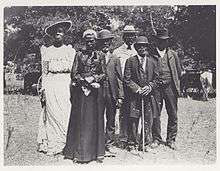
Formerly enslaved people in Galveston celebrated after the announcement.[5] The following year, freedmen in Texas organized the first of what became the annual celebration of "Jubilee Day" on June 19.[21] Early celebrations were used as political rallies to give voting instructions to newly freed slaves.[26] Early independence celebrations often occurred on January 1 or 4.[27]
In some cities black people were barred from using public parks because of state-sponsored segregation of facilities. Across parts of Texas, freed people pooled their funds to purchase land to hold their celebrations.[14][21] The day was first celebrated in Austin in 1867 under the auspices of the Freedmen's Bureau, and it had been listed on a "calendar of public events" by 1872.[24] That year black leaders in Texas raised $1,000 for the purchase of 10 acres (4 ha) of land to celebrate Juneteenth, today known as Houston's Emancipation Park.[28] The observation was soon drawing thousands of attendees across Texas; an estimated 30,000 black people celebrated at Booker T. Washington Park in Limestone County, Texas, established in 1898 for Juneteenth celebrations.[24][29] By the 1890s Jubilee Day had become known as Juneteenth.[16]
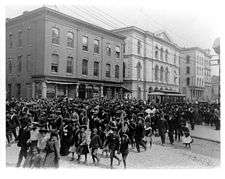
In the early 20th century, economic and political forces led to a decline in Juneteenth celebrations. From 1890 to 1908, Texas and all former Confederate states passed new constitutions or amendments that effectively disenfranchised black people, excluding them from the political process. White-dominated state legislatures passed Jim Crow laws imposing second-class status.[30] Gladys L. Knight writes the decline in celebration was in part because "upwardly mobile blacks [...] were ashamed of their slave past and aspired to assimilate into mainstream culture. Younger generations of blacks, becoming further removed from slavery were occupied with school [...] and other pursuits." Others who migrated to the Northern United States couldn't take time off or simply dropped the celebration.[29]
The Great Depression forced many black people off farms and into the cities to find work. In these urban environments, African Americans had difficulty taking the day off to celebrate. From 1936 to 1951 the Texas State Fair served as a destination for celebrating the holiday, contributing to its revival. In 1936 an estimated 150,000 to 200,000 people joined the holiday's celebration in Dallas. In 1938, Texas governor J. V. Allred issued a proclamation stating in part:[31]
Whereas, the Negroes in the State of Texas observe June 19 as the official day for the celebration of Emancipation from slavery; and
Whereas, June 19, 1865, was the date when General Robert [sic] S. Granger, who had command of the Military District of Texas, issued a proclamation notifying the Negroes of Texas that they were free; and
Whereas, since that time, Texas Negroes have observed this day with suitable holiday ceremony, except during such years when the day comes on a Sunday; when the Governor of the State is asked to proclaim the following day as the holiday for State observance by Negroes; and
Whereas, June 19, 1938, this year falls on Sunday; NOW, THEREFORE, I, JAMES V. ALLRED, Governor of the State of Texas, do set aside and proclaim the day of June 20, 1938, as the date for observance of EMANCIPATION DAY
in Texas, and do urge all members of the Negro race in Texas to observe the day in a manner appropriate to its importance to them.
Seventy thousand people attended a "Juneteenth Jamboree" in 1951.[31] From 1940 through 1970, in the second wave of the Great Migration, more than five million black people left Texas, Louisiana and other parts of the South for the North and the West Coast. As historian Isabel Wilkerson writes, "The people from Texas took Juneteenth Day to Los Angeles, Oakland, Seattle, and other places they went."[32] In 1945, Juneteenth was introduced in San Francisco by an immigrant from Texas, Wesley Johnson.[33]
During the 1950s and 1960s, the Civil Rights Movement focused the attention of African Americans on expanding freedom and integrating. As a result, observations of the holiday declined again (though it was still celebrated regionally in Texas).[26][27] It soon saw a revival as black people began tying their struggle to that of ending slavery. In Atlanta, some campaigners for equality wore Juneteenth buttons. During the 1968 Poor People's Campaign to Washington, DC, called by Rev. Ralph Abernathy, the Southern Christian Leadership Conference made June 19 the "Solidarity Day of the Poor People’s Campaign".[33][24] In the subsequent revival, large celebrations in Minneapolis and Milwaukee emerged[34] as well as across the Eastern United States.[35] In 1974 Houston began holding large-scale celebrations again,[16] and Fort Worth, Texas, followed the next year. Around 30,000 people attended festivities at Sycamore Park in Fort Worth the following year.[26] The 1978 Milwaukee celebration was described as drawing over 100,000 attendees.[35]
Prayer Breakfast and Commemorative Celebration
In 1979, Democratic State Representative Al Edwards of Houston, Texas successfully sponsored legislation to make Juneteenth a paid Texas state holiday. The same year he hosted the inaugural Al Edwards’ Prayer Breakfast and Commemorative Celebration on the grounds of the 1859 home, Ashton Villa. As one of the few existing buildings from the Civil War era and popular in local myth and legend as the location of Major General Granger’s announcement, Edwards’ annual celebration includes a local historian dressed as the Union general[36] reading General Order No. 3 from the second story balcony of the home. The Emancipation Proclamation is also read and speeches are made.[37][38] Representative Al Edwards died of natural causes April 29, 2020 at the age of 83,[39] but the annual prayer breakfast and commemorative celebration continued at Ashton Villa with the late legislator's son, Jason Edwards, speaking in his father’s place.,[40][41]
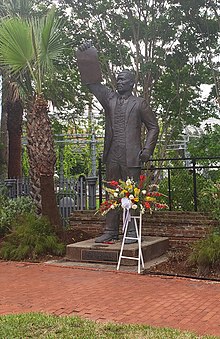
Official recognition
.jpg)
In the late 1970s when the Texas Legislature declared Juneteenth a "holiday of significance [...] particularly to the blacks of Texas,"[27] it became the first state to establish Juneteenth as a state holiday.[42] The bill passed through the Texas Legislature in 1979 and was officially made a state holiday on January 1, 1980.[24] Juneteenth is a "partial staffing" holiday in Texas; government offices do not close but agencies may operate with reduced staff, and employees may either celebrate this holiday or substitute it with one of four "optional holidays" recognized by Texas.[43] In the late 1980s, there were major celebrations of Juneteenth in California, Wisconsin, Illinois, Georgia, and Washington, D.C.[16]
In 1996, the first legislation to recognize "Juneteenth Independence Day" was introduced in the U.S. House of Representatives, H.J. Res. 195, sponsored by Barbara-Rose Collins (D-MI). In 1997 Congress recognized the day through Senate Joint Resolution 11 and House Joint Resolution 56. In 2013, the U.S. Senate passed Senate Resolution 175, acknowledging Lula Briggs Galloway (late president of the National Association of Juneteenth Lineage) who "successfully worked to bring national recognition to Juneteenth Independence Day", and the continued leadership of the National Juneteenth Observance Foundation.[44]
Activists are pushing Congress to recognize Juneteenth as a national holiday.[45] Organizations such as the National Juneteenth Observance Foundation are seeking a Congressional designation of Juneteenth as a national day of observance.[14]
In 2020, state governors of Virginia and New York signed an executive order recognizing Juneteenth as a paid day of leave for state employees.[46][47]
Subsequent growth

Since the 1980s and 1990s, the holiday has been more widely celebrated among African-American communities and has seen increasing mainstream attention in the US.[29][48] In 1991, there was an exhibition by the Anacostia Museum (part of the Smithsonian Institution) called “Juneteenth ’91, Freedom Revisited”.[34] In 1994, a group of community leaders gathered at Christian Unity Baptist Church in New Orleans to work for greater national celebration of Juneteenth.[29][48] Expatriates have celebrated it in cities abroad, such as Paris.[49] Some US military bases in other countries sponsor celebrations, in addition to those of private groups.[49][50] In 1999, Ralph Ellison's novel Juneteenth was published, increasing recognition of the holiday.[51] By 2006, at least 200 cities celebrated the day.[34]
The holiday has gained mainstream awareness outside African-American communities through depictions in entertainment media, such as episodes of TV series Atlanta (2016)[52] and Black-ish (2017),[53] the latter of which featured musical numbers about the holiday by Aloe Blacc, The Roots,[54] and Fonzworth Bentley.[55][56] In 2018 Apple added Juneteenth to its calendars in iOS under official US holidays.[57] In 2020, several American corporations and educational institutions including Twitter, the National Football League, Nike, announced that they would treat Juneteenth as a company holiday, providing a paid day off to their workers,[58] and Google Calendar added Juneteenth to its US Holidays calendar.[59] Also in 2020, a number of major universities formally recognized Juneteenth,[60][61] either as a "day of reflection" or as a university holiday with paid time off for faculty and staff.[61]
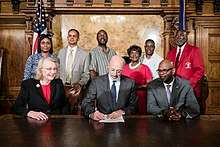
In 2020, in the midst of the COVID-19 pandemic and the worldwide protests sparked by the police killing of George Floyd, controversy ensued when President Donald Trump scheduled his first political rally since the pandemic's outbreak for Juneteenth in Tulsa, Oklahoma, site of the 1921 race massacre in the Greenwood district. In response, he rescheduled the rally for the following day.[63][64] In an interview with The Wall Street Journal, Trump said, "I did something good: I made Juneteenth very famous. It’s actually an important event, an important time. But nobody had ever heard of it."[65]
Calls for further recognition
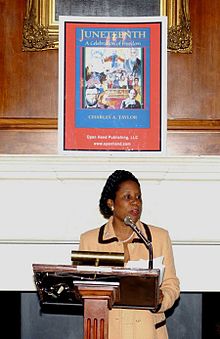
Recognition of Juneteenth varies across the United States. It is not officially recognized by the federal government, although the Senate unanimously passed a simple resolution in 2018 in honor of the day,[66][67] and legislation has been introduced in Congress several times to make it either a "national day of observance" (akin to Flag Day or Patriot Day)[68] or a full-scale federal holiday.[69][70]
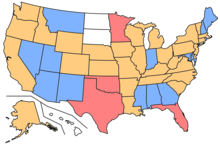
Most states recognize it in some way, either as a ceremonial observance or a state holiday. Texas was the first state to recognize the date, in 1980. By 2002, eight states officially recognized Juneteenth[71] and four years later 15 states recognized the holiday.[27] By 2008, nearly half of states observed the holiday as a ceremonial observance.[11] By 2019, 47 states and the District of Columbia recognized Juneteenth,[69] although only one state (Texas) has adopted the holiday as a paid holiday for state employees.[72] In 2020, Massachusetts Governor Charles Baker issued a proclamation that the day would be marked as "Juneteenth Independence Day". This followed the filing of bills by both the House and Senate to make Juneteenth a state holiday. Baker did not comment on these bills specifically, but promised to grant the observance of Juneteenth greater importance.[73]
The only three states yet to legally recognize Juneteenth as either a state or ceremonial holiday are Hawaii, North Dakota, and South Dakota.[74][75] Governor Kristi Noem of South Dakota proclaimed June 19, 2020, as Juneteenth Day, spurring calls for it to be recognized annually, rather than just for 2020.[76] Similarly, North Dakota Governor Doug Burgum announced that the state would formally recognize Friday, June 19, 2020, as Juneteenth Day in North Dakota for the year 2020.[77]
Some cities and counties have recognized Juneteenth through proclamation. In 2020, Juneteenth was formally recognized by New York City (as an annual official city holiday and public school holiday, starting in 2021);[78] by the City and County of Honolulu (as an "annual day of honor and reflection"),[79] and by Portland, Oregon (as a day of remembrance and action and a paid holiday for city employees).[80]
Some private companies have adopted Juneteenth as a paid day off for employees, while others have officially marked the day in other ways, such as moments of silence.[81][82]
Celebrations
The holiday is considered the "longest running African-American holiday"[29] and has been called "America's second Independence Day".[71] It is often celebrated on the third Sunday in June.[49] Historian Mitch Kachun considers that celebrations of the end of slavery have three goals: "to celebrate, to educate, and to agitate".[83] Early celebrations consisted of baseball, fishing, and rodeos. African Americans were often prohibited from using public facilities for their celebrations, so they were often held at churches or near water. Celebrations were also characterized by elaborate large meals and people wearing their best clothing.[29] It was common for former slaves and their descendants to make a pilgrimage to Galveston.[34] As early festivals received news coverage, Janice Hume and Noah Arceneaux consider that they "served to assimilate African-American memories within the dominant 'American story'. "[84]
Observance today is primarily in local celebrations.[85] In many places Juneteenth has become a multicultural holiday.[86] Traditions include public readings of the Emancipation Proclamation, singing traditional songs such as "Swing Low, Sweet Chariot" and "Lift Every Voice and Sing", and reading of works by noted African-American writers such as Ralph Ellison and Maya Angelou.[85] Celebrations include picnics, rodeos, street fairs, cookouts, family reunions, park parties, historical reenactments, blues festivals and Miss Juneteenth contests.[29][34][49][87][88] Strawberry soda is a traditional drink associated with the celebration.[34] The Mascogos, the descendants of Black Seminoles, who have resided in Coahuila, Mexico since 1852, also celebrate Juneteenth.[89]
Juneteenth celebrations often include lectures and exhibitions on African-American culture.[83] The modern holiday places much emphasis upon teaching about African-American heritage. Karen M. Thomas wrote in Emerge that "community leaders have latched on to [Juneteenth] to help instill a sense of heritage and pride in black youth." Celebrations are commonly accompanied by voter registration efforts, the performing of plays, and retelling stories.[90] The holiday is also a celebration of soul food and other food with African-American influences. In Tourism Review International, Anne Donovan and Karen DeBres write that "Barbecue is the centerpiece of most Juneteenth celebrations".[91]
See also
Notes
- Slaves in Union hands had not been freed by the Emancipation Proclamation due to the limited scope of presidential "war powers". See Emancipation Proclamation#Coverage for more information.
References
- Fonrouge, Gabrielle (June 19, 2020). "What is Juneteenth and who has made it an official holiday?". New York Post. Retrieved June 19, 2020.
- "Juneteenth Celebrated in Coachella". Black Voice News. June 22, 2011. Archived from the original on January 22, 2012.
- "Juneteenth: Our Other Independence Day". Smithsonian. Retrieved June 27, 2019.
- "Cel-Liberation Style! Fourth Annual Juneteenth Day Kicks off June 19". Milwaukee Star. June 12, 1975. Retrieved May 7, 2020.
- "It Happened: June 19". Milwaukee Star, vol. 14, no. 42. June 27, 1974. Retrieved May 5, 2020.
- "What to know about Juneteenth, the emancipation holiday". NBC News. Retrieved June 19, 2020.
- Gates Jr., Henry Louis (January 16, 2013). "What Is Juneteenth?". PBS.org. Retrieved June 12, 2020.
- Editors, History com. "13th Amendment". HISTORY. A&E Television Networks, LLC. Retrieved June 19, 2020.CS1 maint: extra text: authors list (link)
- "10 Facts: The Emancipation Proclamation". American Battlefield Trust. American Battlefield Trust. August 9, 2012. Retrieved June 19, 2020.
- Taylor, Amy. "The Border States (U.S. National Park Service)". National Park Service. U.S. Department of the Interior. Retrieved June 19, 2020.
- Cruz, Gilbert (June 18, 2008). "A Brief History of Juneteenth". Time. Retrieved May 30, 2013.
- Congressional Research Service (June 3, 2020). "Juneteenth: Fact Sheet" (PDF). Retrieved June 19, 2020.
- "Preliminary Emancipation Proclamation, 1862". The National Archives. Retrieved June 3, 2020.
- Gates, Henry Louis, Jr. "What Is Juneteenth?". The African Americans: Many Rivers to Cross. PBS. Originally posted on The Root. Retrieved September 30, 2014.
- Barr (1996), p. 24.
- Garrett-Scott, Shennette (2013). ""When Peace Come": Teaching the Significance of Juneteenth". Black History Bulletin. 76 (2): 19–25. JSTOR 24759690.
- Gates, Henry Louis, Jr. "What Is Juneteenth?". The African Americans: Many Rivers to Cross. PBS. Originally posted on The Root. Retrieved September 30, 2014.
- "Serial set (no.3100-3500)". July 20, 1896 – via Google Books.
- https://www.washingtonpost.com/history/2020/06/18/juneteenth-holiday-history-slavery-george-floyd/
- https://www.galvestonhistory.org/news/juneteenth-and-general-order-no-3
- "Juneteenth". Texas State Library and Archives Commission. Retrieved July 6, 2006.
- COTHAM, ED. "Juneteenth: Four myths and one great truth". The Daily News.
- "Galveston unveils long-awaited Juneteenth marker". HoustonChronicle.com. June 22, 2014.
- Wynn 2009.
- Campbell, Randolph (1984). "The End of Slavery in Texas: A Research Note". Southwestern Historical Quarterly. 88 (1): 71–80. JSTOR 30239840.
- "Juneteenth Adds Continuity to Black Tradition". Fort Worth Star-Telegram. June 13, 1976. p. 100. Retrieved June 4, 2020 – via Newspapers.com

- Wilson 2006, p. 239.
- Mustakeem 2007.
- Knight 2011.
- Adams, Luther (November 29, 2010). Way Up North in Louisville: African American Migration in the Urban South, 1930–1970. University of North Carolina Press. ISBN 978-0807899434.
- Wiggins, Jr., William H. "Juneteenth: A Red Spot Day on the Texas Calendar". Juneteenth Texas. University of North Texas Press. pp. 237–254 – via Project MUSE.
- Wilkerson, Isabel (2010). The Warmth of Other Suns: The Epic Story of America's Great Migration. New York: Random House. Retrieved June 19, 2015.
- Emily Blanck, "Galveston on San Francisco Bay: Juneteenth in the Fillmore District, 1945–2016." Western Historical Quarterly 50.2 (2019): 85–112.
- Jaynes 2005.
- Wiggins, William (June–July 1993). "Juneteenth: tracking the progress of an emancipation celebration". American Visions.
- News, JENNIFER REYNOLDS/The Daily. "Juneteenth celebrated in Galveston". The Daily News.
- Evans, Thayer; Correspondent, Chronicle (June 15, 2006). "Galveston to receive Juneteenth statue". Houston Chronicle.
- Rice, Harvey (June 19, 2015). "Houston legislator recalls fight for Juneteenth holiday". Houston Chronicle.
- Scherer, Jasper (April 29, 2020). "Al Edwards, former state rep behind bill that created Juneteenth, dies at 83". HoustonChronicle.com.
- News, MATT DEGROOD The Daily. "Galveston County Juneteenth events give voice to history, even amid pandemic". The Daily News.
- News, JOHN WAYNE FERGUSON The Daily. "After crises and loss, Juneteenth in Galveston 'feels different'". The Daily News.
- Dingus, Anne (June 2001). "Once a Texas-only holiday marking the end of slavery, Juneteenth is now celebrated nationwide with high spirits and hot barbecue". Texas Monthly. Retrieved October 11, 2013.
- "State of Texas Holiday Schedule – Fiscal 2019". comptroller.texas.gov. Retrieved June 19, 2019.
- "S.Res.175 – A resolution observing Juneteenth Independence Day, June 19, 1865, the day on which slavery finally came to an end in the United States". United States Congress. June 19, 2013. Retrieved June 19, 2015.
- E.H. Turner, . "Juneteenth: The Evolution of an Emancipation Celebration." European Contributions to American Studies. 65 (2006): 69–81.
- "Cuomo declares Juneteenth a holiday for New York state employees". www.cbsnews.com. Retrieved June 18, 2020.
- "Virginia Executive Order 66 (2020)" (PDF). www.governor.virginia.gov. Retrieved June 18, 2020.
- Chandler, D.L. (June 19, 2012). "Juneteenth: Celebrating The Early Moments Of Freedom Today". News One. Retrieved June 19, 2014.
- Moskin, Julie (June 18, 2004). "Late to Freedom's Party, Texans Spread Word of Black Holiday". The New York Times. Retrieved April 28, 2011.
- "The World Celebrates Freedom". Juneteenth.com. Retrieved June 19, 2006.
- Guzzio 1999.
- Ho, Rodney (October 25, 2016). "FX's 'Atlanta' recap ('Juneteenth'): season 1, episode 9". Atlanta Journal-Constitution. Retrieved June 18, 2018.
- Framke, Caroline (October 4, 2017). "Black-ish's musical episode about Juneteenth is a pointed lesson on American ignorance". Vox. Retrieved June 18, 2018.
- "I Am A Slave". YouTube. ABC News. Retrieved June 18, 2018.
- "We Built This". YouTube. ABC Television Network. Retrieved June 18, 2018.
- Butler, Berhonie (October 4, 2017). "'Blackish' gives a powerful history lesson – with nods to 'Hamilton' and 'Schoolhouse Rock'". The Washington Post. Retrieved June 18, 2018.
- Ciaccia, Chris (February 16, 2018). "Apple's iCal calendar mysteriously deletes Easter". Fox News.
- "Starting the trend for making Juneteenth a company holiday". CBS News. Retrieved June 12, 2020.
- "Google makes Juneteenth an official Google Calendar holiday". Android Police. June 16, 2020. Retrieved June 16, 2020.
- Greta Anderson, Growing Recognition of Juneteenth, Inside Higher Ed (June 19, 2020).
- Laura Ly, Amid nationwide rallies and celebrations, more cities, states and universities designate Juneteenth as an official holiday, CNN (June 20, 2020).
- "Governor Wolf Declares "Juneteenth National Freedom Day" in Pennsylvania". Governor Tom Wolf. June 19, 2019. Retrieved June 19, 2020.
- Courtney Subramanian, Trump stirs anger with plans for Juneteenth rally in Tulsa, site of huge massacre of African Americans, USA Today (June 11, 2020).
- DeNeen L. Brown, Trump rally in Tulsa, site of a race massacre, on Juneteenth was 'almost blasphemous,' historian says, Washington Post (June 13, 2020).
- Bender, Michael (June 19, 2020). "Trump Talks Juneteenth, John Bolton, Economy in WSJ Interview". The Wall Street Journal. Retrieved June 19, 2020.
- Lauren Aratani, Calls to make Juneteenth a US federal holiday gain momentum, The Guardian (June 18, 2020).
- S.Res.547 - A resolution designating June 19, 2018, as "Juneteenth Independence Day" in recognition of June 19, 1865, the date on which slavery legally came to an end in the United States, 115th Congress (2017-2018), Congress.gov.
- Texas senator proposes national Juneteenth holiday to celebrate the end of slavery, The Takeaway, PRI (June 19, 2012).
- Rebecca Shabad, Senators propose bill to make Juneteenth a federal holiday, NBC News (June 19, 2020).
- Olivia B. Waxman, Activists Are Pushing to Make Juneteenth a National Holiday. Here’s the History Behind Their Fight, Time (June 17, 2020).
- Dart, Bob (June 19, 2002). "Juneteenth Crossing Nation". The Baltimore Sun. pp. A2. Retrieved June 4, 2020 – via Newspapers.com

- Caleb Stewart, Virginia likely to become the 2nd state marking Juneteenth as a state holiday, WHSV (June 16, 2020).
- Reed, Jodi (June 19, 2020). "MA lawmakers declare 'Juneteenth' as state holiday". WWLP.com. Retrieved June 21, 2020.
- Fonrouge, Gabrielle (June 18, 2020). "What is Juneteenth and who has made it an official holiday?". New York Post. Retrieved June 19, 2020.
- MacDONALD, MARGIE. "Guest view: Montana embraces joyous Juneteenth". The Billings Gazette. Retrieved June 19, 2020.
- Kaczke, Lisa; Huber, Makenzie. "As Noem issues Juneteenth proclamation, some South Dakotans push for state-recognized holiday". Argus Leader. Retrieved June 19, 2020.
- KFYR. "North Dakota to recognize Juneteenth Celebration Day". KFYR-TV. Retrieved June 19, 2020.
- New York City declares Juneteenth an official holiday, BBC News (June 19, 2020).
- "Honolulu to officially recognize Juneteenth". KHON2. June 19, 2020. Retrieved June 19, 2020.
- Madison Smalstig, City of Portland will make Juneteenth a paid holiday, day of remembrance, The Oregonian (June 2020).
- Yelena Dzhanova, Here's a running list of all the big companies observing Juneteenth this year, CNBC (June 19, 2020).
- Clare Duffy, A growing number of companies are giving employees the day off to celebrate Juneteenth, CNN Business (June 18, 2020).
- Hume & Arceneaux 2008, p. 156.
- Hume & Arceneaux 2008, p. 159.
- Taylor, 2002. pp. 28–29.
- Hume & Arceneaux 2008, p. 158.
- Taylor, Nicole (June 13, 2017). "Hot Links and Red Drinks: The Rich Food Tradition of Juneteenth". The New York Times. ISSN 0362-4331.
- Acosta, Teresa Palomo (June 15, 2010). "Juneteenth". Texas Historical Society. Retrieved June 5, 2020.
- "Mascogos. Siempre listos para partir". El Universal (in Spanish). September 19, 2016. Retrieved July 31, 2017.
Sin embargo, la fiesta de la comunidad es el 19 de junio – el Juneteenth Day en Estados Unidos – el día que los esclavos de Galveston, Texas, supieron que eran libres.
- Thomas, Karen M. (June 1993). "Texas: Juneteenth Day". Emerge. 8 (4): 31.
- Donovan, Anne; DeBres, Karen (2006). "Foods of Freedom: Juneteenth as a Culinary Tourist Attraction". Tourism Review International. 9: 379–389.
Bibliography
- Barr, Alwyn (1996). Black Texans: A History of African Americans in Texas, 1528–1995. University of Oklahoma Press. ISBN 978-0806128788.
- Guzzio, Tracie Church (1999). "Juneteenth". In Samuels, Wilford D. (ed.). Encyclopedia of African-American Literature. Facts on File.
- Hume, Noah; Arceneaux, Janice (2008). "Public Memory, Cultural Legacy, and Press Coverage of the Juneteenth Revival". Journalism History. 34 (3): 155–162. doi:10.1080/00947679.2008.12062768.
- Jaynes, Gerald David (2005). "Juneteenth". Encyclopedia of African American Society. SAGE Publications. pp. 481–482.
- Knight, Gladys L. (2011). "Juneteenth". Encyclopedia of African American Popular Culture. Greenwood. pp. 798–801. OCLC 694734649.
- Mustakeem, Sowandé (2007). "Juneteenth". In Rodriguez, Junius (ed.). Encyclopedia of Emancipation and Abolition in the Transatlantic World. Routledge.
- Taylor, Charles A. (2002). Juneteenth: A Celebration of Freedom. Open Hand Pub Llc. ISBN 978-0940880689.
- Turner, E. H. "Juneteenth: The Evolution of an Emancipation Celebration." European Contributions to American Studies. 65 (2006): 69-81.
- Wiggins Jr, William H. "They Closed the Town Up, Man! Reflections on the Civic and Political Dimensions of Juneteenth." in Celebration: Studies in Festivity and Ritual, ed. Victor Turner (1982): 284–295.
- Wilson, Charles R. (2006). The New Encyclopedia of Southern Culture: Volume 4: Myth, Manners, and Memory. University of North Carolina Press. doi:10.5149/9781469616704_wilson. ISBN 978-0-8078-3029-1.
- Wynn, Linda T. (2009). "Juneteenth". In Carney Smith, Jessica (ed.). Freedom Facts and Firsts: 400 Years of the African American Civil Rights Experience. Credo Reference.
External links
| Wikimedia Commons has media related to Juneteenth. |
| Look up Juneteenth in Wiktionary, the free dictionary. |
- Juneteenth History, website for Juneteenth World Wide Celebration
- Jennifer Schuessler, "Liberation as Death Sentence", The New York Times, June 11, 2012
- Berkeley Juneteenth Festival, 2014 celebration
- Juneteenth: Fact Sheet Congressional Research Service (updated June 3, 2020)
- Juneteenth in United States
- Juneteenth World Wide Celebration, website for 150th anniversary celebration
- Juneteenth Historical Marker, Juneteenth historical marker at 2201 Strand, Galveston, TX 77550
